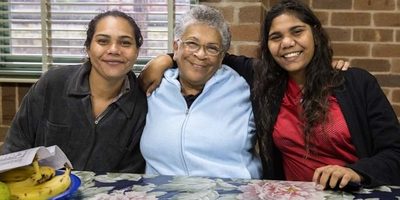
Caroline Lukaszyk: making a difference in Aboriginal and Torres Strait Islander health
Caroline Lukaszyk is a PhD student and Project Manager of the Ironbark project, which works with communities to help improve Aboriginal and Torres Strait Islander health.
How long have you been working at The George Institute?
I’ve worked at The George Institute for almost 2 years, since February 2013.
What attracted you to working at The George Institute?
Their focus on health research in a global context, working within different countries and cultures with a large and diverse team, across a broad range of health areas.
What is the focus of your PhD?
My PhD is to develop a falls prevention program specifically for older Aboriginal people living in NSW, Australia, trialling it in 7 communities across the state. Each stage of program development has been guided by input from the communities we have formed partnerships with, ensuring the program is effective and appropriate for participants.
What is a recent highlight?
Having the opportunity to travel to, meet and work with different communities. Learning more about Australian Aboriginal culture has been an incredible experience.
What is your professional background?
My original areas of study were chemistry and immunology. After completing a medical internship in Tamil Nadu in the South of India, this changed to global health. Since completing my Masters in International Public Health, I’ve been involved in multiple community health projects, both overseas and within Australia. My experiences have allowed me to travel and learn more about approaches to health and wellbeing in different cultures. I’ve always found it very rewarding to work on a grassroots level and to have direct contact with the people using the services I have been a part of.
My biggest achievement so far….
After the hard work everyone involved in the project has put into developing and delivering the Ironbark Project, having the opportunity to see participants enjoy and benefit from the program first-hand.
Can you tell us about your role in the Iron Bark Project?
I am the Project Manager for the Ironbark Project. My main role has been to coordinate the development and day-to-day running of the program across all pilot sites. My job involves a lot of travelling and spending time with the communities hosting the program, which is the best part of the role.
Why is research important for Aboriginal and Torres Strait Islander Health?
Research, conducted in partnership with local Aboriginal and Torres Strait Islander people and organisations, is beneficial in identifying health priority areas and in understanding health concerns from communities. This allows more targeted healthcare interventions to be developed and made available to Aboriginal and Torres Strait Islander people.


